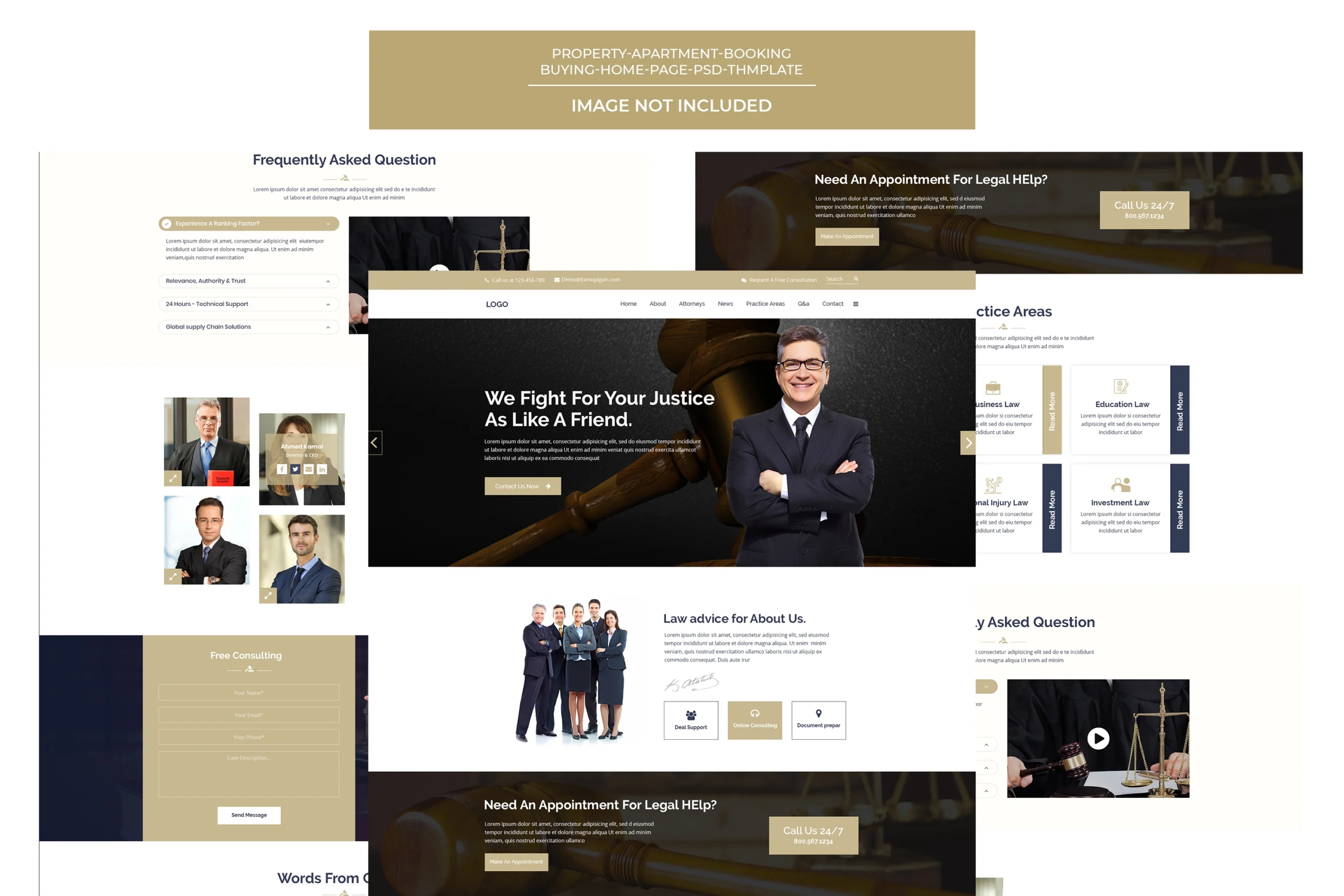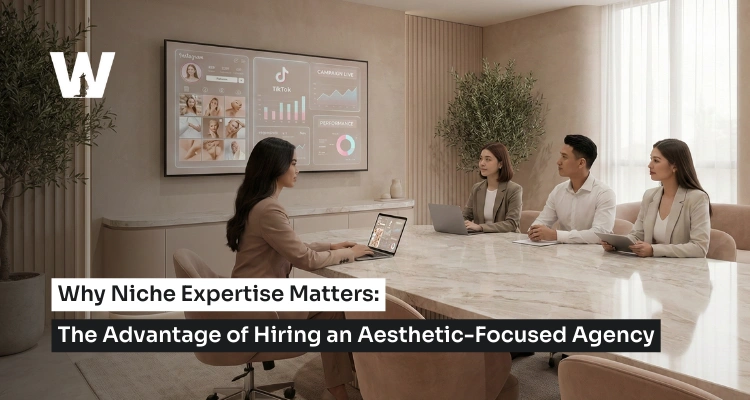Wraps up in 12 Minutes
Digital marketing for lawyers isn't about flashy websites or clever social media posts—it's about understanding why potential clients research legal services for months but never pick up the phone. Most law firms invest thousands in marketing that looks impressive but fails to generate meaningful leads because they've missed the fundamental psychology behind how people choose legal representation.
At Wolfable, we've helped countless legal practices transform their digital presence by focusing on what truly matters: building trust, reducing barriers, and making the decision to contact a lawyer feel natural rather than overwhelming.
Why Do Most People Research Lawyers for Months but Never Make the Call?
1. What Clients Really Think When They Need Legal Help
When someone searches "do I need a lawyer" at 11pm, they're not just seeking information—they're experiencing genuine fear about their situation. Legal decision paralysis occurs because potential clients feel overwhelmed by both their problem and the prospect of dealing with lawyers.
The average person spends 6-8 weeks researching legal services before making contact. During this time, they're not just comparing qualifications; they're trying to convince themselves they actually need professional help.
2. Why "Impressive" Law Firm Websites Actually Scare Prospects Away
Traditional law firm websites focus on awards, credentials, and impressive case histories. However, this creates a psychological barrier known as the "expertise trap." When prospects see too much emphasis on prestige, they worry about being judged or feeling foolish.
Effective legal websites balance competence with approachability. The lawyer website fear factor diminishes when visitors see genuine case studies, clear explanations, and evidence that the firm understands everyday client concerns.
3. The Expertise Trap: When Being Too Qualified Becomes a Barrier
Prospects often think: "This lawyer is too prestigious for my small problem" or "They'll charge me a fortune just for a consultation." This creates resistance even before the first phone call.
Smart law firm website optimisation addresses this by showcasing expertise through educational content rather than intimidation. When you explain complex legal concepts in simple terms, you demonstrate both knowledge and accessibility.
Build a powerful WordPress site with the Top WordPress Development Agency in London.
4. Why Potential Clients Convince Themselves They Don't Need a Lawyer Yet
"Do I need a lawyer" searches spike during evening hours when people worry about their problems but convince themselves to wait. They'll often tell themselves they need to gather more information, try handling it themselves, or wait until the situation becomes more serious.
This delay tactic stems from cost anxiety, fear of commitment, and the mistaken belief that lawyers only help with major crises.
The 6 Silent Killers of Law Firm Growth
1. Why Lawyers Sabotage Their Own Marketing Efforts
Many lawyers unconsciously undermine their marketing because they feel uncomfortable with self-promotion. This marketing mindset for attorneys creates content that's technically correct but emotionally disconnected.
Successful legal marketing requires shifting from "Here's why we're qualified" to "Here's how we solve problems like yours."
2. The Perfectionist's Curse: How Over-Editing Destroys Authentic Connection
Lawyers often edit their content until it sounds like a legal brief rather than human communication. This lawyer marketing mistake removes personality, warmth, and relatability—the very qualities that build trust.
The most effective legal content marketing maintains professional accuracy whilst feeling conversational and approachable.
3. Why "Professional" Content Feels Cold and Unapproachable
Traditional legal content prioritises formality over connection. Risk-averse marketing produces websites and social media that look similar to every other law firm, making differentiation impossible.
| Traditional Legal Approach | Trust-Building Legal Approach |
|---|---|
| "We provide excellent legal representation" | "We understand how stressful legal problems can be" |
| Lists of practice areas | Stories of how we've helped similar clients |
| Awards and accolades | Clear explanations of what to expect |
| Complex legal language | Plain English explanations |
4. The Time Trap: Why Busy Lawyers Stay Busy but Not Profitable
Lawyer burnout and profitability issues often stem from attracting the wrong clients or failing to systematise client acquisition. Many lawyers stay busy with low-value work because they haven't invested in proper digital marketing systems. Effective SEO and content marketing creates a steady flow of qualified leads, allowing lawyers to be selective about the cases they accept.
5. Risk Aversion: How Playing It Safe Guarantees Invisibility
Legal training emphasises caution and precision, but these qualities can handicap marketing efforts. Lawyers often avoid taking positions, sharing opinions, or creating content that might be controversial—but this makes their marketing forgettable.
6. The Selling Struggle: Why Lawyers Feel Uncomfortable Promoting Themselves
Lawyer sales resistance stems from professional culture that views marketing as undignified. However, effective legal marketing isn't about "selling"—it's about educating prospects and making legal services feel accessible.

What Do Prospects Really Want (But Will Never Tell You)?
1. Beyond Credentials: The Hidden Factors That Influence Hiring Decisions
Emotional trust in legal services trumps credentials every time. Prospects want to know you understand their situation, won't judge them, and can explain complex matters clearly.
Client psychology for lawyers reveals that hiring decisions are 70% emotional and 30% logical, yet most law firm marketing appeals only to logic.
2. Why Client Testimonials Don't Work and What Does Instead
Traditional testimonials feel scripted and unbelievable. Instead, detailed case studies that show your thought process, challenges faced, and how you communicated with clients throughout the process build genuine credibility.
Video testimonials work better than written ones because they're harder to fake and allow prospects to see real emotional responses from satisfied clients.
3. The Trust Equation: What Makes Someone Comfortable Calling a Stranger About Personal Problems
Trust = (Credibility + Reliability + Intimacy) ÷ Self-Orientation
Prospects need to see evidence that you're competent (credibility), consistent (reliability), and genuinely care about their wellbeing (intimacy) rather than just your own success (low self-orientation).
4. How to Position Expertise Without Intimidation
Lawyer humanisation strategies involve showing your personality, admitting when situations are complex, and demonstrating empathy for client concerns. Share behind-the-scenes content that shows you as a real person dealing with everyday challenges.
5. Why Prospects Need to See You as Both Competent and Human
The most successful legal marketing balances professional competence with personal relatability. Prospects want a lawyer who's brilliant in the courtroom but approachable in consultation.
The Client's Secret Journey: From Crisis to Consultation
1. The Trigger Moment: When People First Realise, They Might Need Legal Help
Legal client buyer journey begins with a specific incident: receiving a legal notice, facing a divorce, dealing with an employment issue, or recognising a business problem requires professional expertise.
Understanding these trigger moments helps create content that appears when prospects are most receptive.
2. Information Gathering as Emotional Protection: Why Prospects Research Extensively
Pre-consultation research behaviour serves as emotional armour. The more people understand their situation and their options, the more confident they feel about making contact.
Smart law firms create educational content that guides this research whilst positioning themselves as the logical choice.
3. The Comparison Trap: Why Endless Evaluation Prevents Decision-Making
Law firm comparison process often becomes overwhelming, leading to decision paralysis. Prospects compare fees, experience, location, and personality, often spending more time researching than necessary.
Effective marketing helps prospects understand what really matters and positions your firm as the obvious choice.
4. Building Confidence in Uncertainty: What Prospects Need to Feel Before Calling
Emotional barriers to hiring a lawyer include fear of costs, worry about time commitment, and anxiety about sharing personal information. Address these concerns proactively in your content.
5. Decision Fatigue: How to Make Choosing You Feel Obvious and Easy
Simplify the decision-making process by clearly explaining your approach, being transparent about costs, and making initial contact as easy as possible.
Content That Connects Instead of Impresses
1. Stories That Sell Without Selling: Case Studies That Create Emotional Investment
Case study marketing for law firms should focus on the client's journey rather than legal technicalities. Show how you helped someone in a similar situation overcome their challenges.
Effective case studies include:
- The client's initial concerns and emotions
- Your approach to addressing their specific needs
- Obstacles encountered and how you overcame them
- The final outcome and client relief
2. Educational Content That Builds Dependency, Not Just Awareness
Create content that makes prospects think: "I understand my situation better now, and I definitely need professional help." Educational content for lawyers should increase confidence in your expertise whilst highlighting the complexity of legal matters.
3. How to Show Competence While Revealing Humanity
Storytelling for attorneys involves sharing professional insights alongside personal observations. Discuss how certain cases affected you emotionally or what you learned from challenging situations.
4. Content Formats That Break Through Mental Filters
Different content formats for legal services appeal to various learning styles:
- Video explanations for visual learners
- Detailed blog posts for thorough researchers
- Infographics for quick information gathering
- Podcasts for busy prospects who prefer audio content
5. Creating Urgency Without Manipulation
Legitimate urgency in legal marketing comes from highlighting time-sensitive aspects of legal issues rather than artificial deadlines. Explain statute of limitations, filing deadlines, or how delays can complicate matters.
The Science of First Impressions and Lasting Memory
1. Website Elements That Instantly Build or Destroy Trust
First impression in legal websites happens within 3 seconds. Essential UX trust elements for law firms include:
- Professional but welcoming photography
- Clear contact information prominently displayed
- Mobile-optimised design
- Fast loading times
- Easy navigation to key information
2. How People Actually Consume Legal Content (Hint: They Don't Read)
Legal content consumption habits reveal that visitors scan rather than read. Use short paragraphs, bullet points, subheadings, and highlighted key information to accommodate this behaviour.
Most prospects spend less than 2 minutes on law firm websites initially, so crucial information must be immediately visible.
3. Making Your Firm Unforgettable in a Forgettable Industry
Law firm brand recall strategies focus on distinctive positioning rather than generic professional imagery. What makes your approach unique? How do you solve problems differently?
4. How Legal Emergencies Affect Decision-Making
Psychology of legal emergencies shows that stressed prospects make decisions differently. They prioritise availability, clear communication, and emotional support over credentials or cost considerations.
5. Follow-Up Strategies That Feel Helpful, Not Pushy
Effective follow-up provides additional value rather than just checking in. Send relevant articles, updates on similar cases, or helpful resources that demonstrate ongoing concern for their situation.

Pricing Communication That Reduces Sticker Shock
1. How Clients Mentally Categorise and Justify Legal Expenses
Lawyer pricing psychology reveals that clients compare legal fees to the cost of not addressing their problem rather than to other purchases. Help them understand the value equation clearly.
2. Making Your Fees Feel Reasonable (Even When They're Not Cheap)
Fee transparency in legal services builds trust and reduces sticker shock. Explain what clients receive for their investment and how your expertise saves them time, stress, and potentially money.
3. Payment Methods That Reduce Financial Anxiety
Payment flexibility for attorneys might include:
- Payment plans for larger matters
- Flat fees for routine services
- Clear estimates with explanation of variables
- Transparent billing practices
4. Setting Expectations That Make Fee Discussions Smoother
Setting expectations with legal clients about costs, timeline, and process prevents misunderstandings and builds confidence in your professionalism.
The Dark Side: Marketing Tactics That Destroy Trust
1. When Helpful Becomes Manipulative (And How to Avoid the Line)
Legal marketing ethics require genuine helpfulness rather than manipulation. Focus on providing real value rather than creating artificial urgency or fear.
2. Why Scare Tactics Create Short-Term Wins but Long-Term Damage
Fear-based legal advertising might generate immediate responses but damages long-term reputation and attracts clients who make decisions based on panic rather than confidence.
3. The Urgency Trap: When Deadlines Feel Fake
Fake urgency in law firm ads creates prospect resistance triggers. Instead, focus on legitimate time considerations and help prospects understand why timing matters for their specific situation.
4. How Pushy Marketing Triggers Prospect Resistance
Aggressive marketing tactics cause prospects to become defensive and less likely to engage. Focus on education and support rather than pressure.
| Trust-Building Marketing | Manipulative Marketing |
|---|---|
| Educational content that helps regardless | Content designed only to generate leads |
| Honest timeline expectations | Artificial urgency |
| Transparent pricing discussions | Hidden costs or vague estimates |
| Authentic case studies | Exaggerated success claims |
| Genuine concern for client outcomes | Focus only on firm profits |
Essential Digital Marketing Strategies to Implement These Trust-Building Principles
To transform these psychological insights into practical results, law firms need a comprehensive digital marketing approach. The following strategies provide the foundation for implementing the trust-building techniques discussed throughout this guide.
1. Strategic Website Development and User Experience Design
Professional website development for lawyers focuses on reducing barriers rather than impressing visitors. Your site should load quickly, display perfectly on mobile devices, and guide prospects naturally toward contact.
Effective legal website design balances credibility with approachability, ensuring visitors feel confident in your expertise whilst comfortable reaching out for help.
2. Search Engine Optimisation (SEO) for Legal Services
SEO for law firms ensures your educational content appears when prospects search for answers to their legal concerns. Local SEO strategies help you dominate searches in your geographic area.
Organic search visibility builds trust because prospects discover you naturally rather than through paid advertisements, making your expertise feel more credible and authoritative.
3. Content Marketing That Educates and Converts
Strategic content marketing for attorneys transforms the insights from this guide into blog posts, videos, and resources that build trust over time. Educational content positions you as a helpful expert before prospects need your services.
Consistent content creation establishes thought leadership whilst addressing the specific concerns and questions that keep potential clients awake at night.
4. Social Media Marketing for Professional Services
Legal social media marketing builds familiarity and trust through regular, valuable content sharing. Platforms like LinkedIn and Facebook allow prospects to observe your personality and expertise before making contact.
Social proof through client interactions and professional engagement demonstrates your approachability whilst maintaining appropriate professional boundaries.
5. Email Marketing and Lead Nurturing Systems
Email marketing for lawyers nurtures prospects through their research phase with helpful resources and insights. Automated sequences can guide potential clients from initial interest to consultation booking.
Strategic follow-up campaigns keep your firm visible during the weeks or months prospects spend researching their options, ensuring you remain top-of-mind when they're ready to engage.
6. Pay-Per-Click (PPC) Advertising and Local Visibility
PPC advertising for legal services captures prospects actively searching for immediate help. Google Ads and local directory listings ensure visibility for time-sensitive legal matters.
Strategic paid advertising complements organic efforts by providing immediate visibility whilst your SEO and content marketing strategies build long-term sustainable growth.
7. Video Marketing and Visual Storytelling
Legal video marketing humanises your practice by allowing prospects to see and hear you before meeting in person. Video testimonials and educational content build trust more effectively than written content alone.
Behind-the-scenes content and case study videos demonstrate your approach whilst making your expertise feel accessible rather than intimidating.
8. Reputation Management and Review Optimisation
Online reputation management for lawyers ensures positive client experiences translate into visible testimonials and reviews. Strategic review generation and response management builds social proof that influences hiring decisions.
Professional reputation monitoring protects your practice from negative content whilst amplifying positive client feedback across relevant platforms.

Conclusion: Transform Your Legal Practice with Strategic Digital Marketing
Digital marketing for solicitors and lawyers succeeds when it prioritises client psychology over firm promotion. The most effective law firm marketing strategy acknowledges that prospects are anxious, overwhelmed, and seeking both competence and compassion.
At Wolfable, we specialise in helping legal practices build authentic digital presences that attract quality clients through strategic SEO, compelling content marketing, and conversion-optimised website development. Our white label services and comprehensive digital solutions have helped numerous law firms transform their client acquisition systems.
Whether you need SEO optimisation, social media marketing, video development, or complete website redesign, our team understands the unique challenges facing legal professionals in today's digital landscape.
Ready to transform your legal practice's digital marketing? Visit Wolfable UK today for a comprehensive marketing audit and strategic consultation. Let us help you build a digital presence that attracts quality clients and grows your practice sustainably.







